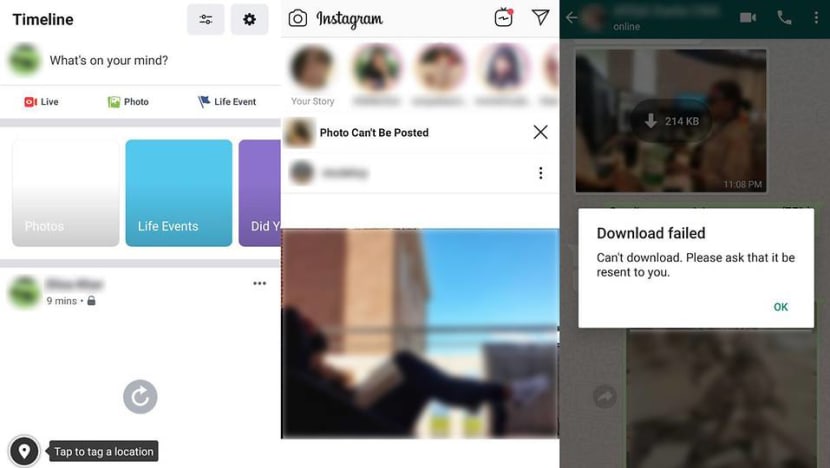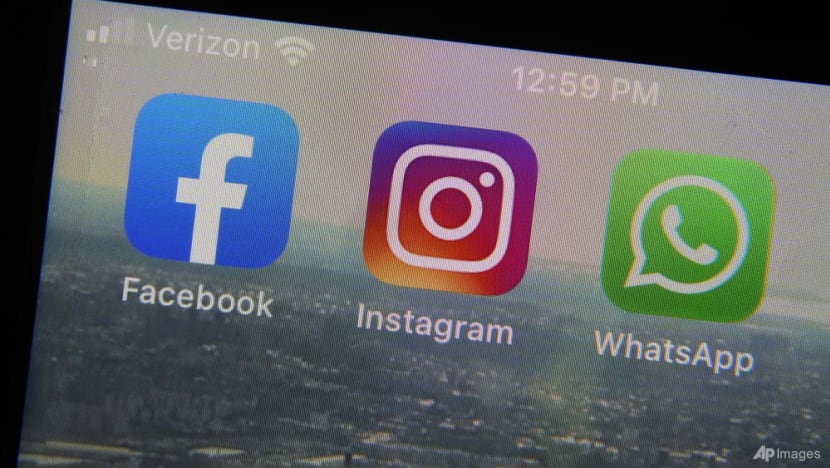Commentary: Distressing for people’s lives when lights go off during Facebook outage
The rise of the super app has changed our lives – and livelihoods – as many of us depend on these social media sites to make a living. Are there alternatives or are we always going to be held hostage? SMU’s Seshan Ramaswami gives his take.

Screengrabs showing outage issues on (left to right) Facebook, Instagram and WhatsApp.
SINGAPORE: The recent simultaneous outage of Facebook, Instagram and WhatsApp for six hours on Oct 4, and then again for two hours on Oct 8, raises a lot of big questions for business, government and society.
Chief among these is how should one company control so much “infrastructure” and if these break down, what protections are there for billions who rely on them?
For most of us, Facebook is just an app where we are updated on news and what friends are up to. But it isn’t – it is an entire infrastructure.
It certainly began as just an app enabling friends to network. It soon grew and through acquisitions it is now a behemoth, owning Instagram and WhatsApp, both of which also went down with Facebook.
Facebook’s increasing number of offerings, such as payment systems, e-commerce, live video broadcast, and possibly digital currency in the future means that as it grows, it increasingly takes on the form of infrastructure, a singular platform that enables a wide variety of transactions for consumers and for businesses.
In that infrastructure like market, it competes with other eco-systems – the Alphabet system of Google-Chrome-Android-YouTube-Google Pay-Gmail and others, the Apple system of hardware, software and payment systems and entertainment, and the Amazon system of Ecommerce-WebServers-Entertainment.
When Singtel, StarHub or M1, which are private profit-making entities suffer an outage, in addition to the business and reputational damage, the Singapore Government usually imposes a punitive fine. This creates an additional incentive for these companies to improve their maintenance processes, as they are providing vital Internet connectivity.
Is the Facebook trio of applications any different?
LIVELIHOODS AT STAKE
Of course, unlike the telecom industry, there are no regulatory barriers to entry in these ecosystems. But all these three apps have the property of what economists call “network externality”.
For most products, utility does not depend on others using it too. But in products like say, a fax machine or a multi-player game, the more users there are, the more useful the product becomes to everyone.
This applies to social media platforms - the more active users there are of Facebook, WhatsApp and Instagram, the greater the usefulness. So at some point, it will become practically impossible for new entrants to become serious competitors as they will have to grow that entire network of users from scratch to capitalise on this externality.
Many businesses rely on one or more of this trio of apps for their livelihoods too. In countries like Myanmar, Facebook is the main app for e-commerce.
WhatsApp is used by some businesses, even in Singapore, as the primary order placement platform. Many companies use their Instagram or Facebook page as their default and sometimes, only, website.
There are alternatives to each of these applications. There is a host of messenger applications, numerous social media networks, and photo-based sharing websites and applications such as Tumblr or Pinterest.
Yet, these three apps have dominated the world of social media. Should one company be allowed to operate all these three applications? The disruption of these services apart, the tremendous amount of data that these three software services generate at the individual level makes Facebook a very powerful corporation which may well deter competition and pose serious threats to consumer privacy concerns.
The outage highlights these anti-trust issues in a very real way to governments around the world. Indeed, one can argue that governments too are directly affected.
Without that instantaneous ability to reach an audience of millions, the work of politicians, influencers, non-profits and businesses can be damaged irreparably. Many of them have built their business and messaging on a social media platform, and their livelihoods can be strangled when access is cut off because of an outage.
Imagine a disruption to WhatsApp in the days immediately preceding an election. Those days of campaigning are often critical to increasing turnout on election day, not to mention the operational demands of organising an election.
Facebook’s outage only heightens concerns about other monopoly-like services like Google for search, LinkedIn for professional networking and job search, and Twitter for its ability to organise mass movements.
Find out why billions of dollars are going into SPACs or special purpose acquisition companies, and what you need to know if you're thinking of putting your money into them on CNA's Money Mind:
FORCED DISCONNECT
The outage also presents a threat to Facebook’s hold on consumers. Some may not even have realised one company owns all of them and this will make them far more sensitive to privacy and outage threats.
For those who don’t rely on them for business, the outage may have brought some psychological relief in realising there is life outside of social media which can mean more focus and mindfulness when these toys are taken away.
Several studies show those who disconnected themselves from social media accounts felt rejuvenated or happier. It is like an addiction that you were forced off for a period – it is both distressing and yet revealing.
This may be the start of real danger for a monopoly-like corporation - like an “out of stock” situation, leading some consumers to look for alternatives and they may never return.
Imagine if McDonald’s restaurants were closed for a week. Many loyal customers may try a Burger King meal for the first time and realise it wasn’t so bad! Or that switching to a healthier meal was not that inconvenient or expensive and made for a fulfilling and tasty meal.
AN EVOLVED NETIZEN
A variety of statistical surveys show that Singaporeans are heavy users of all three apps in the Facebook basket. Eighty-seven per cent of Singaporeans in the age group 16 to 64 use WhatsApp, according to GlobalIndex.com. Other studies indicate that there are 4.68 million Facebook users and 2.5 million Instagram users in Singapore.
Happily for Singapore, the first Facebook outage happened past midnight. The next outage with Facebook or some other ecosystem could happen during the day, and could last longer. There are lessons we can all learn as consumers from this warning.
First, as hard as this sounds, is to reduce our dependence on any one ecosystem.
Each of the networks, Facebook, Google, Apple, Amazon will try hard to draw us in - to download the app, to buy the hardware, to use them more, encourage our friends and family on to the platform and to use the set as a one-stop access to the convenience of all offerings on the Internet – payment, communication, information, entertainment.

This has already happened in a big way in China with super apps like WeChat that enable texting, sharing of photographs, making payments and playing video games. Others like Grab are also slowly creeping into super app status with microfinancing, payment, ride-hailing, food and grocery delivery.
Inconvenient as it might be to manage multiple passwords and accounts, it is prudent to use different ecosystems for different transactions – consider Telegram or Signal for messaging, Facebook for networking with friends, and banking apps for payments.
Small businesses should aim to at least have a basic presence in the form of a website, that offers some information to their potential customers, with contact details or a form for customers to get in touch.
Consider alternatives like Duckduckgo a search engine claiming not track your searches across time. Not allowing any one tech ecosystem to own all your data is a personal responsibility.
Third-party apps and websites often present the option of registering with a Gmail or Facebook account. That makes it more convenient as there is one less password to remember. But when we do that, we have just added another tranche of data to our current dataset with one of the networks, and further entrenched our dependence on that network.
That convenience is what these networks are banking on – so spreading out the risk by creating several baskets instead of just relying on one can help.
Outages can perhaps be prevented through some technical separation of the operations of the different apps, or better backup systems. Yet, the threat to businesses and daily social living is real.
As users, we can do our part to ensure we are not held hostage and scrambling for answers when the lights go out.
Dr Seshan Ramaswami is Associate Professor of Marketing Education at the Singapore Management University.
















